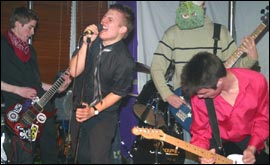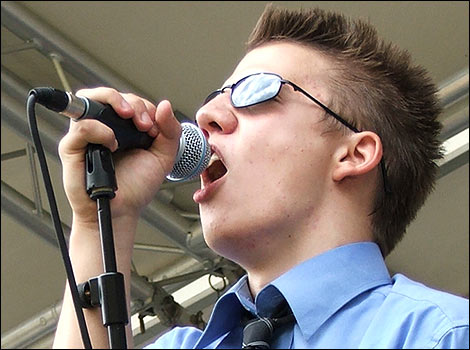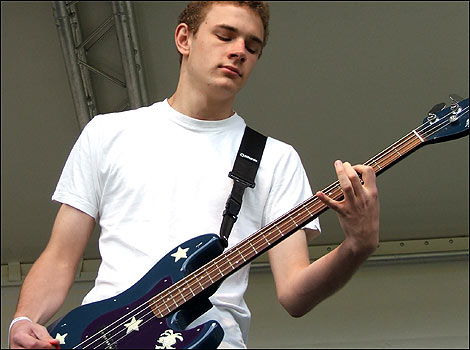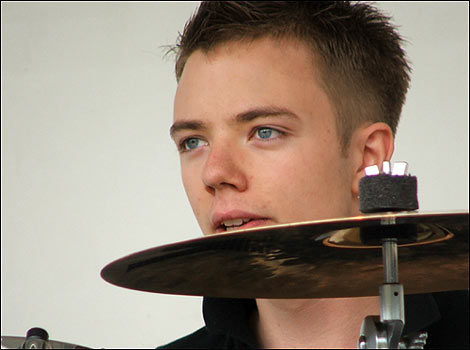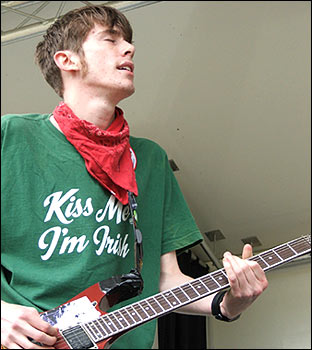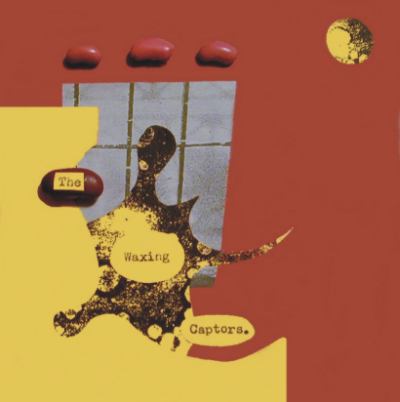
|
The Waxing Captors: An Obituary The moment for evangelising is past. I'm trying to convert you to Nietzsche's God, proffering a holiday brochure for Communist Russia, canvassing for David Lloyd George. If writing about music is dancing about architecture then this is a gung-ho frug apropos the World Trade Center, once of Manhattan, NYC. This sentence should read 'The Waxing Captors are a fucking brilliant band, and I urge you to go and see them'. Because this sentence should've been written months ago, when the subject was in the same present tense as the opinion. Now there's no imploration, no imperative, no point in these paragraphs. There's just a sombre caveat: The Waxing Captors were a fucking brilliant band.
A bit of a highfalutin opening gambit with which to start a flight of (syco)fancy about a two-bit four-bob Vauxhall Conference unsigned band, maybe. But the Captors were - in some pointless, pretentious, provincial way - important. In a similar way to the way in which The Monsoon Bassoon were important and [CultureIndustry] were important and a hundred other bands who were someone else's little secret were important. And as I never got around to eulogising about tMB or [CI], The Captors will have to serve as their unwitting analogue. And as Joni Mitchell drably whimpered with apposite whimsy, you don't know what you've got till it's gone. And like all true Paradisiac bands, there currently isn't much of a parking lot. Maybe it's harder for bands that operate in tiny spheres to get new balls rolling. That, though, is part of the magic, I guess. The ashes to ashes, dust to dust of a band's burnout leaves a better taste in the mouth than Libertine to Babyshamble, Pistol to Public Image (this isn't a specific dig at Messrs Moss or Spungen's latterday outputs, but mythmaking seems to be a 20th century pastime and there's a dizzying sense of aftershock with spin-off bands that make them feel like old ideas that came off their axis. That said, 'Metal Box' would be my Lydonian bollocks of choice, but never mind…). To borrow boxing parlance, you can't make a soufflé rise twice.
What I may be trying to say here is that your heroes shouldn't be your 'friends' on Myspace, but that's a debate that I can't be arsed to have with myself now, especially because I'm talking about my mateheroic heromates and I'd be deservedly accused of talking bollocks. But having waxed on, the Captors have waxed off, and the locomotion from local heroes to local legends has been suitably smooth. How the Captors made merry and made myth isn't an easy thing to pinpoint, and pure authorial perversity makes me want to not bother trying. So, to preserve the pretentious purity of this piece, please feel free to bypass the next nine paragraphs. The Captors made a noise that sounded like someone pushing popular culture down a stairwell with tender loving violence. They were a pop group, in the way that the Blockheads were a pop group, in the way that Atari Teenage Riot were a pop group, in the way that The Eighties Matchbox B-Line Disaster are (in spite of the sinister echoes of the moneymen's best efforts to sterilise their voodoo brew) a pop group. They were awkward, uncompromising and quite often silly buggers. They were like kids on the first and best drugs of their adolescence going mental in a sonic amusement arcade, giggling at the lights, watching things beep and rattle and making them doing it again, fasterfasterfaster. They had a song called 'Slot Machines', which was clearly about the one-arm-bandits that made your eyes sparkle as a kid at the end of the pier, not about the melancholy, TV-series tie-in efforts that skulk in pub corners, systematically guzzling the 50p bits of the miserable or acting as a shelf for your pint. I'm not sure what it was about, but that, somehow, was/is never the point. They didn't sound like the above bands - they didn't sound like anyone (although there were nudges of Dexys, the Pixies, the Boomtown Rats, Squeeze and Dawn of the Replicants that flashed through the spinning dials of symbols), but the three reels always ended up showing 'The' 'Waxing' and 'Captors', and their slot machine rattled out popsongs, and the ideas that cascaded out of every song were always scooped up, pocketed, and fed back into the next tune.
They paid every attention to detail, revelled in every moment of disposable magic for an ecstatic nanosecond before discarding it with a flourish and moving swiftly on with a wink, a lurch, an atonal battlecry. They buzzed and hissed and shrieked with kinetic energy, utterly out of control but happy in their anachronistic anarchy. That's not to say they weren't committed to the ideas they had, but every song was like an experiment. And a proper experiment at that, not a studious, hypothesis-testing procedure. They wrote like they worked on instinct, like ideas were something you just had, not something you could formulate, hone or perfect. In a definitively doomed attempt to explain the inexplicable magnificence of the Captors, let's pluck one out of these songs out of the ether at random. It's called 'Atolia of San Bernadino'. I'm not sure who Atolia was, or what an Atolia is, and whether it's animal, vegetable, mineral, or a combination thereof. Anyway, it's written in the first person (insofar as the odd line features a cursory 'I' or 'me' before staggering like a crackhead into incomprehensibility), so we'll assume Atolia is either a definite or indefinite article. Whether we're talking about Atolia as opposed to Steve, Shirley, Brenda or Alan, or Atolia as opposed to Butcher, Messiah, Goalkeeper, Scourge or Ayatollah, I couldn't be sure. We can, however, get a geographical handle on it. The Atolia in question - or our hero Atolia, depending - is based in/located in/hails from/haunts/saves/etc San Bernadino. There's a San Bernadino in Mexico, and one in Georgia, northwest of Atlanta. There's also one in the Alicante region of Spain. I am as confident as one can possibly be through guesswork alone that no San Bernadino on earth holds any particular importance for any member of the Waxing Captors. What is this Atolia of whichever San Bernadino to which it belongs? What is its significance? More pertinently, why is it songworthy? Having listened to the song about seven thousand times, I have precisely no idea. Nor do I know the words.
Rarely can 228 words be written about a song title alone and reveal nothing. This is at least part of their Captorial magic. And although it's a representative song title, it's not even their best. They have a song called 'Fresleven's Remains', one called 'Situ Scoping', one called 'O Ar Alberto Novo' and one called 'File Under Rock/Pop'. None of them reveal anything about anything at all, other than possibly a willingness to pilfer from Bob Mould. And even that's not something I'm sure they'd do deliberately. Anyway, 'Atolia of San Bernadino' is one of my favourite songs written by anyone, ever (OK, mea culpa, I didn't really choose it at random). And while I'm fairly sure I could recite most of the lyrics to, say, 'My Own Private Patrick Swayze' by the Male Nurse, or 'I Want To Kill Somebody' by S*M*A*S*H, or 'Song From Under The Floorboards' by Magazine, or most of my other favourite songs by anyone, ever (I could go on, but you get the idea), and I reckon I know the majority of the lyrics to stuff I don't particularly like ('Baby One More Time', say, or 'Fools Gold'), from memory alone, I can recite the following lyrics to 'Atolia…' Ummm… Err… "[something something something] / "(Pause)" "OOOH-OOOH-OOH-OOOOOH / OOOH-OOH-OOH-OOOH-OOOOH-OOH-OOOOH-OOOH
OOH" (x2[possibly]) / [the line ending in "recognition" again] / […?] "Write it all down / I write it all down"
So why is it effective? Affective? How can music manage to be (without wishing to be twee) so inspiring when, if you dissect it, it's incomprehensible It's partly because the guitars sound less like musical instruments and more like beasts hewn from a thirtieth century petri dish using the DNA of a bee and a bandsaw. It's partly because 'I wanna be on television' is sung with the kind of tragiapocalyptic, majestic desperation that sees masses massacred, revolutions born, worlds destroyed (and knowing its authors I'm fairly confident that it's essentially fiction, in spite of a keen sense of perilously-near-end-of-the-pier irony). It's partly because the drums bounce out of the speakers like a drooling Daschund marauding across a trampoline to a temple of Pedigree Chum. It's partly because it's threatening. It's partly because it's perfect pop music.
But mostly, it's hewn from memories. It's the soundtrack to a handful of boozy nights in dingy dives huddling in no-hope towns along the A14 corridor of uncertainty, where The Captors built empires for evenings before packing up their paraphernalia and skulking modestly away in hatchbacks. It was a joke that maybe 20 people got, maybe 50. But, like the best jokes, it wasn't primarily funny. It was brilliant, the kind of magic that you want to share, the kind of magic that marketing men pretend their products are made of. The kind of magic that occurs in one place at one time, that can never be replicated or recreated or replaced. Waxing Captors gigs were incendiary, silly, friendly, confusing affairs, but most of all memorable. Unforgettable, in spite of the Kronenbourg and the detritus. And, for many, these gigs shaped an era. I was in the right place at the right time to watch the Libertines spiral upwards from scuzzhole ubiquity to darlinghood before spiralling into the redtop black hole, and I get what the fuss is about (although the likelihood is that you probably don't, and I probably understand why). Anyway, that's another story, documented elsewhere. The Waxing Captors didn't have that trajectory, but they had the spark. Maybe they represented a coming-of-age for many. The ending of an age for many more. Maybe for some, possibly The Captors themselves, these gigs will represent the best days of their lives, an apogee that'll never be outdone. I hope not, as they're five lovely people with the guts, brains, flair, talent and suss to do it all again in another place, another time, another way. But what they shared was magical. Too special to name individual gigs, individual moments, individuals. The lifespan of a dead band rarely matters. But when it does, no records, no documentation, no contextualising, no memoirs will tell the story. Pop music, performance, the visceral crackle of the future in the drooling amplifiers - they're ephemeral, and that's why I love them. That's why I'll miss the Captors. But wouldn't wish them back. And, ironically… That's why I write it all down.
Matt Abysmal.
Pix nicked from the BBC Be Hard of Heart about this rant on our message boards here
|
